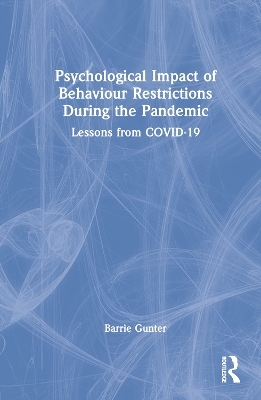
Psychological Impact of Behaviour Restrictions During the Pandemic
Lessons from COVID-19
Seiten
2022
Routledge (Verlag)
978-1-032-22828-0 (ISBN)
Routledge (Verlag)
978-1-032-22828-0 (ISBN)
This volume examines the undesirable or harmful cognitive, emotional and behavioural side-effects of COVID-19, and of behavioural restrictions during the pandemic. It is essential reading for researchers in psychology, public health and medical sciences, and policy makers assessing government strategies, responses, and performance.
This volume examines the undesirable or harmful cognitive, emotional and behavioural side-effects of COVID-19 and of the behavioural restrictions imposed by governments on their populations during the pandemic.
Societal "lockdowns" and other intervening behavioural restrictions, built significantly around social isolation, used by governments to control the spread of COVID-19 disrupted the lives of most people. There were economic costs for many as workplaces closed down, as well as severe stresses on friendships and romantic relationships, an increase in instances of abuse and domestic violence, and concerns about people drinking too much alcohol or gambling too much as compensatory behaviours. Understanding which people were at risk, and in what ways, could teach important lessons for the future. Presenting a timely review of the most recent international research and evidence, author Barrie Gunter assesses the major collateral, psychological side-effects of the pandemic. Looking forward, Gunter also considers how new models might be developed that take into account not just the need to halt the spread of a new virus, but also minimise collateral damage which could be every bit as severe in both the short term and long term.
Identifying and analysing the nature and severity of collateral side-effects of pandemic-related behaviour restrictions, this is essential reading for students and researchers in psychology, public health and medical sciences and policymakers assessing government strategies, responses and performance.
This volume examines the undesirable or harmful cognitive, emotional and behavioural side-effects of COVID-19 and of the behavioural restrictions imposed by governments on their populations during the pandemic.
Societal "lockdowns" and other intervening behavioural restrictions, built significantly around social isolation, used by governments to control the spread of COVID-19 disrupted the lives of most people. There were economic costs for many as workplaces closed down, as well as severe stresses on friendships and romantic relationships, an increase in instances of abuse and domestic violence, and concerns about people drinking too much alcohol or gambling too much as compensatory behaviours. Understanding which people were at risk, and in what ways, could teach important lessons for the future. Presenting a timely review of the most recent international research and evidence, author Barrie Gunter assesses the major collateral, psychological side-effects of the pandemic. Looking forward, Gunter also considers how new models might be developed that take into account not just the need to halt the spread of a new virus, but also minimise collateral damage which could be every bit as severe in both the short term and long term.
Identifying and analysing the nature and severity of collateral side-effects of pandemic-related behaviour restrictions, this is essential reading for students and researchers in psychology, public health and medical sciences and policymakers assessing government strategies, responses and performance.
Barrie Gunter is an Emeritus Professor in Media at the University of Leicester, United Kingdom. A psychologist by training, he has published more than 80 books on a range of media, marketing, business, leisure and psychology topics.
Chapter 1: The COVID-19 Pandemic: Hindsight and Foresight
Chapter 2: Lockdown Side-Effects: Public Fear
Chapter 3: Lockdown and Loneliness
Chapter 4: Lockdown and Mental Health
Chapter 5: Lockdown, Mental Health and the Young
Chapter 6: Lockdown and Panic Buying Behaviour
Chapter 7: Friendships, Romance and Social and Sexual Relations
Chapter 8: The Pandemic and Destructive Behaviour
Chapter 9: Lockdown and Alcohol Consumption
Chapter 10: Lockdown and Gambling Behaviour
Chapter 11: Re-Setting Public Behaviour
| Erscheinungsdatum | 27.06.2022 |
|---|---|
| Reihe/Serie | Lessons from the COVID-19 Pandemic |
| Zusatzinfo | 2 Tables, black and white |
| Verlagsort | London |
| Sprache | englisch |
| Maße | 156 x 234 mm |
| Gewicht | 467 g |
| Themenwelt | Sachbuch/Ratgeber ► Gesundheit / Leben / Psychologie |
| Geisteswissenschaften ► Psychologie ► Allgemeine Psychologie | |
| Geisteswissenschaften ► Psychologie ► Sozialpsychologie | |
| Studium ► Querschnittsbereiche ► Prävention / Gesundheitsförderung | |
| Sozialwissenschaften ► Soziologie | |
| ISBN-10 | 1-032-22828-8 / 1032228288 |
| ISBN-13 | 978-1-032-22828-0 / 9781032228280 |
| Zustand | Neuware |
| Informationen gemäß Produktsicherheitsverordnung (GPSR) | |
| Haben Sie eine Frage zum Produkt? |
Mehr entdecken
aus dem Bereich
aus dem Bereich
das Manual zur psychologischen Gesundheitsförderung
Buch | Hardcover (2023)
Springer Berlin (Verlag)
39,99 €
Wissenschaftlich basierte Empfehlungen, Tipps und Ernährungspläne für …
Buch (2022)
Thieme (Verlag)
51,00 €


